Surprising social media statistics

Since the development of the internet, social media has become a primary communication channel for many of us. We use social media to communicate with our family, friends and loved ones. Moreso, we use social media to share our lives; what we do on a daily basis, what we eat, where we go on a night out, when we exercise and what our interests are.
On the other hand, social media isn’t just for talking to our friends and family, or to just share our lives. There are many businesses and organisations who have hopped onto the bandwagon and now are using social media to advertise their new service or product or to promote their business in general.
At its most basic, it’s no surprise that social media has taken the world by storm. Below, we explore the most surprising social media statistics. If you use social media for communication, expressing who you are or to manage your business, these statistics below may make you rethink about all things social media.
Current Social Media Statistics
There are currently around 7.7 billion people in this world, and out of this, 3.49 billion people are using social media. There is no surprise that social media has changed the world, and the number of people using social media is only going to grow.
- On average, a person has 7 different social media accounts (Buffer).
- Facebook is the most popular social media platform, with 2.3 billion users. (Our World in Data).
- Every second, two new members join LinkedIn. (Fast Company).
- On average, an individual spends 3 hours per day on social media, messaging and networking. (Global Web Index).
- Daily active Instagram Stories users increased from 150 million in 2017 to 500 million in January 2019 (Statista).
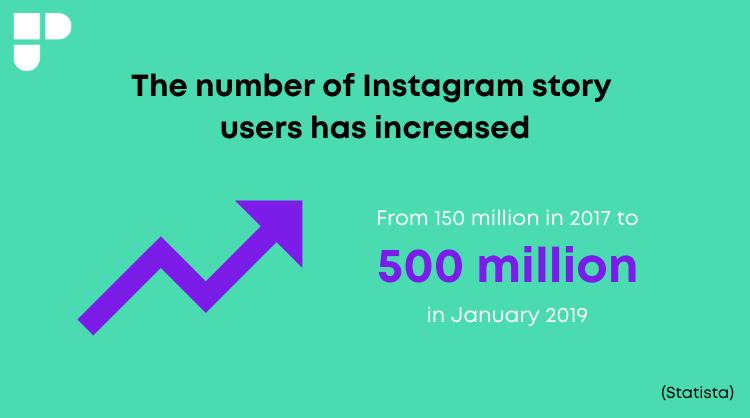
Social Media Around the Globe
There are billions of individuals around the globe who use social media. This platform has created a global community that has connected these people together. Below, we explore which country has the highest number of social media users and which country has the highest population of users.
- With 799.6 users, China has the highest amount of social media users. (Statista).
- Roughly ⅔ of US adults are Facebook users. (PewInternet).
- YouTube ranks as the second most used social media network in the world, with 1.9 billion users. (Buffer).
- Northern, Western and Southern Europe and North America have the highest amount of internet users in the world, with 88%-95% of the population online. (Smart Insights).
- Saudi Arabia has the highest social media penetration, with 99% of its population using social media. (Smart Insights).
- Two thirds of social media users globally access their social media platforms on a mobile device, rather than on a desktop. (The Manifest).
Who is Using Social Media?
Though once believed that social media were only for the young teens and millennials, social media is now being used by people of all different ages. From the older generation wanting to connect with family and friends, to those who want to become technologically savvy, social media is used by everybody.
- The 45-54 year age bracket is the fastest growing demographic on both Facebook and Google+. (Fast Company).
- In 2019, 90.4% of millennials are using social media. (EMarketer).
- Facebook is used by around half of American teens, but it no longer dominates the teen social media landscape. (Pew Research).
- Among US adults who use social media, 74% of them check Facebook at least once a day. (Pew Research).
- 75% of surveyed women use social media multiple times a day, compared to 64% of men. (The Manifest)
- 73% OF people under 25 use Snapchat, compared to the 3% of people over the age of 65. (Our World in Data).
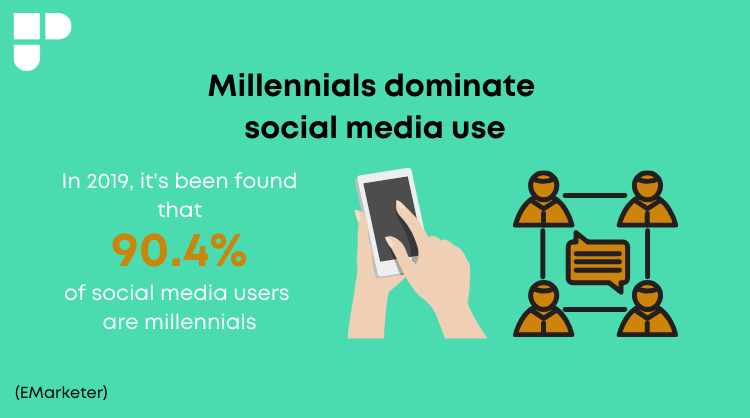
The Impact of Social Media
Social media has had the most influential impact on not only people, their family and friends, the way we communicate, but also for businesses and organisations. We see more and more businesses utilising social media as a tool for marketing and advertising. Ultimately, social media has changed the way many businesses communicate with their consumers.
- 71% of consumers who have had a positive experience with a brand on social media are likely to recommend that brand to their friends and family. (Forbes).
- 49% of social media users depend on influencer recommendations on social media. (Four Communications).
- YouTube reaches more people in the 18-34 age bracket than any other cable network. (Buffer).
- Social Media has overtaken adult content websites as the number one activity on the web. (Fast Company).
- Around 4 in 10 US adults get their news from social media. (Pew Research).
- Though millennials continue to be the generation with the highest use of social media, they have the most access to smartphones. In comparison, Gen X are more likely to be using tablets. (EMarketer).
What do People Use Social Media For?
There are many social media platforms that are catered to suit everybody's needs. No longer is social media dedicated as a communication channel, it is now booming in the entertainment industry, as well as the marketing and business industry.
- 73% of marketers believe that social media marketing has been “somewhat effective” or “very effective” for their business. (Buffer).
- 54% of those using social media are using these platforms to research products. (Global Web Index).
- 93% of marketers use social media for business. (Buffer)
- People are using platforms such as YouTube and Instagram for entertainment, whilst using Facebook for sharing big milestones with family and friends. (The Manifest).
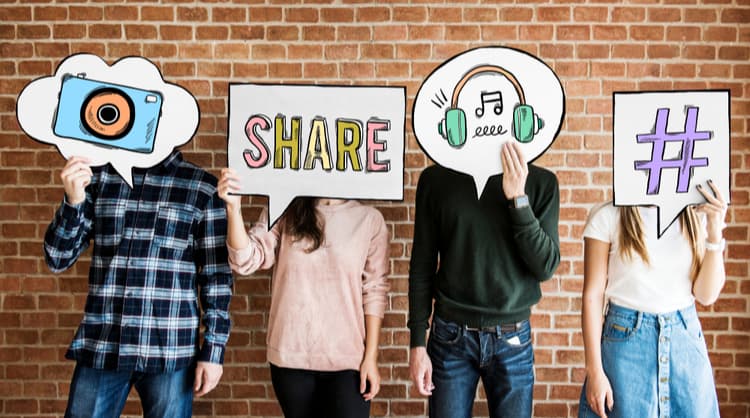
Risks of Social Media
With using any online platform comes a risk. Though there are many benefits to using social media to communicate with loved ones, expressing ourselves or advertising our brand, there are still significant risks to using this platform that could potentially lead to detrimental effects.
- Studies suggest that too much passive use of social media can lead to ADHD symptoms, depression, anxiety and sleep deprivation. (UNICEF).
- 25% of Facebook users don’t bother with privacy settings. (Velocity Digital).
- At least ¾ of Facebook users are not aware that the site lists their traits and interests for advertisers. (Pew Research).
- Of the 1800 surveyed, women reported being more stressed than men. The use of Twitter was found to be a significant contributor. (Pew Research).
- A study published in the journal Computers and Human Behaviour found that people who report using 7 or more social media platforms were more than 3 times as likely as people using 0 to 2 platforms to have high levels of general anxiety symptoms. (BBC).
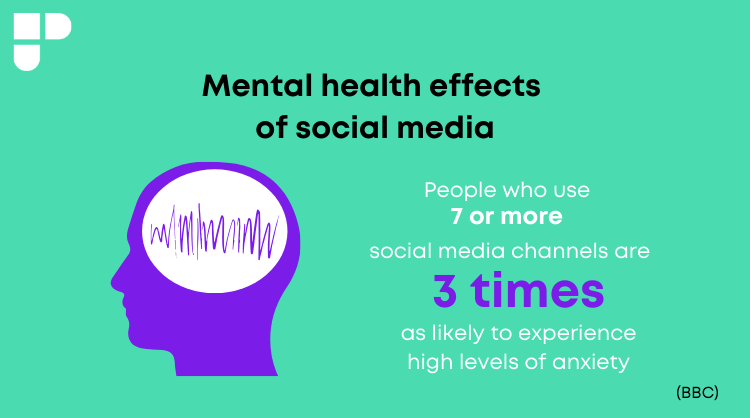
Social Media Predictions
As the demand for evolving social media, new products being delivered instantly, and continuous new content to consume grows, trends in 2021 and beyond predict new platforms, more people using social media and the internet overall.
- In 2021, the number of people using social media is predicted to increase to almost 3.1 billion. (Statista).
- According to Andrew Ng, the chief scientist at Baidu, 50% of searches by 2020 will be done through voice recognition or graphics. (Medium).
- There is predicted to be an increase in shopping related content - including shopping experiences leveraging VR. Many social media platforms are responding by adding more e-commerce features. For example: Instagram has launched Instagram Shopping.
- By 2022, it is estimated that there will be around 19.27 million social media users in Australia. (Statista).
- TikTok, one of the world’s quickest rising social media platforms, is expected to help the influencer market rise to $10 billion by the end of 2020. (Social Bakers).
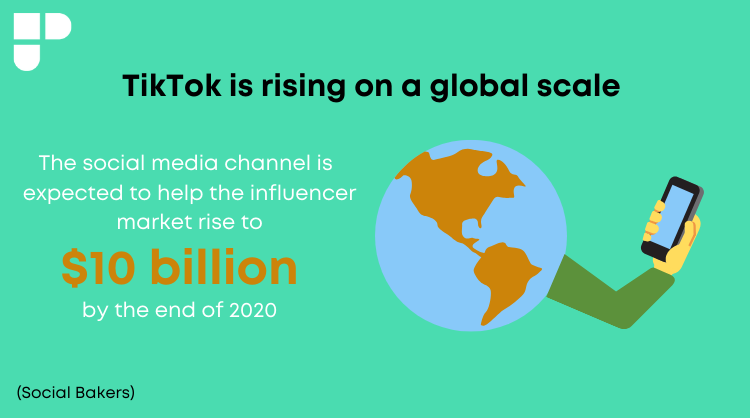
These statistics summarise the importance of social media use on both a personal and business level, as well as the privacy and health risks it may impose. It has also provided us with further insights on how social media advertising is targeted and personalised towards our consumer habits.
Social media is a booming industry, with plenty of growth offered as more platforms are being rolled out to meet the content demands of users around the world. As it’s used as a communication tool to stay connected with friends and family, it’s clear that social media has become ingrained in our lives, more than we realise.


)
)

